人教版高中英语 必修1 各单元课文原文讲课教案
Unit+4+Reading+and+Thinking+教案 高中英语人教版(2019)必修第一册
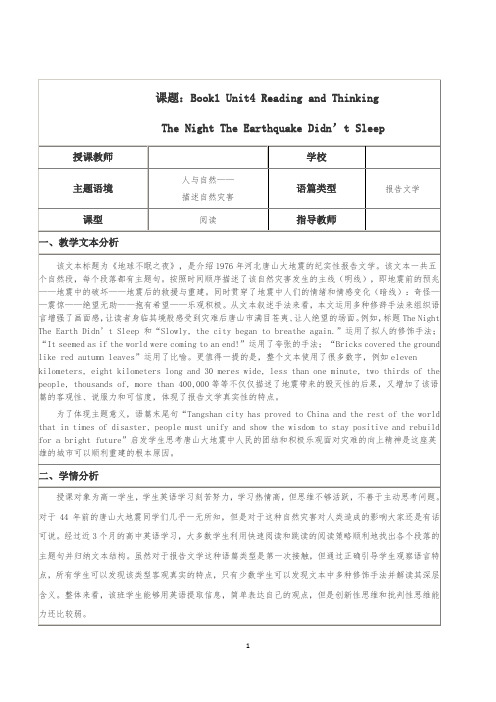
课题:Book1 Unit4 Reading and ThinkingThe Night The Earthquake Didn’t Sleep 授课教师学校人与自然——语篇类型报告文学主题语境描述自然灾害课型阅读指导教师一、教学文本分析该文本标题为《地球不眠之夜》,是介绍1976年河北唐山大地震的纪实性报告文学。
该文本一共五个自然段,每个段落都有主题句。
按照时间顺序描述了该自然灾害发生的主线(明线),即地震前的预兆——地震中的破坏——地震后的救援与重建。
同时贯穿了地震中人们的情绪和情感变化(暗线):奇怪——震惊——绝望无助——抱有希望——乐观积极。
从文本叙述手法来看,本文运用多种修辞手法来组织语言增强了画面感,让读者身临其境般感受到灾难后唐山市满目苍夷、让人绝望的场面。
例如,标题The Night The Earth Didn’t Sleep 和“Slowly, the city began to breathe again.”运用了拟人的修饰手法;“It seemed as if the world were coming to an end!”运用了夸张的手法;“Bricks covered the ground like red autumn leaves”运用了比喻。
更值得一提的是,整个文本使用了很多数字,例如eleven kilometers, eight kilometers long and 30 meres wide, less than one minute, two thirds of the people, thousands of, more than 400,000等等不仅仅描述了地震带来的毁灭性的后果,又增加了该语篇的客观性、说服力和可信度,体现了报告文学真实性的特点。
为了体现主题意义,语篇末尾句“Tangshan city has proved to China and the rest of the world that in times of disaster, people must unify and show the wisdom to stay positive and rebuild for a bright future”启发学生思考唐山大地震中人民的团结和积极乐观面对灾难的向上精神是这座英雄的城市可以顺利重建的根本原因。
人教版高中英语必修1教案5篇
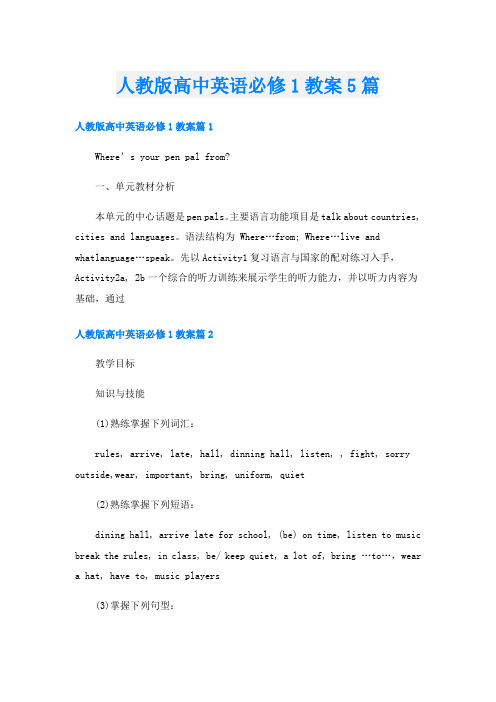
人教版高中英语必修1教案5篇人教版高中英语必修1教案篇1Where’s your pen pal from?一、单元教材分析本单元的中心话题是pen pals。
主要语言功能项目是talk about countries, cities and languages。
语法结构为 Where…from; Where…live and whatlanguage…speak。
先以Activity1复习语言与国家的配对练习入手,Activity2a, 2b一个综合的听力训练来展示学生的听力能力,并以听力内容为基础,通过人教版高中英语必修1教案篇2教学目标知识与技能(1)熟练掌握下列词汇:rules, arrive, late, hall, dinning hall, listen, , fight, sorry outside,wear, important, bring, uniform, quiet(2)熟练掌握下列短语:dining hall, arrive late for school, (be) on time, listen to music break the rules, in class, be/ keep quiet, a lot of, bring …to…,weara hat, have to, music players(3)掌握下列句型:1. Dont eat in class.2. You must be on time.3. Eat in the dining hall.4. 正确使用情态动词can, can’t——Can we wear a hat in school?——Yes, we can./No, we can’t.5. 能正确使用have to 和 must 谈论规章制度We must be on time/ We also have to be quiet in the library. 教学重难点重点:1) 肯定祈使句是省略掉主语的原形动词开头;2) 否定祈使句则是在肯定祈使句前加上“don’t”。
英语人教版高中必修一(新课标)教案Unit1 Reading for Writing 教案
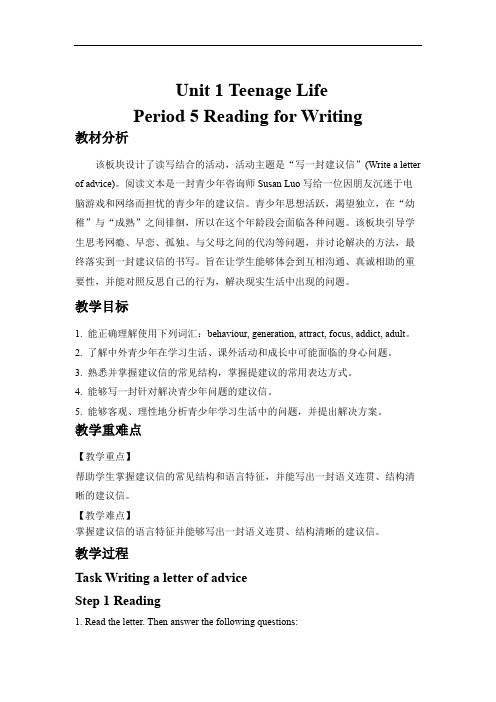
Unit 1 Teenage LifePeriod 5 Reading for Writing教材分析该板块设计了读写结合的活动,活动主题是“写一封建议信”(Write a letter of advice)。
阅读文本是一封青少年咨询师Susan Luo写给一位因朋友沉迷于电脑游戏和网络而担忧的青少年的建议信。
青少年思想活跃,渴望独立,在“幼稚”与“成熟”之间徘徊,所以在这个年龄段会面临各种问题。
该板块引导学生思考网瘾、早恋、孤独、与父母之间的代沟等问题,并讨论解决的方法,最终落实到一封建议信的书写。
旨在让学生能够体会到互相沟通、真诚相助的重要性,并能对照反思自己的行为,解决现实生活中出现的问题。
教学目标1. 能正确理解使用下列词汇:behaviour, generation, attract, focus, addict, adult。
2. 了解中外青少年在学习生活、课外活动和成长中可能面临的身心问题。
3. 熟悉并掌握建议信的常见结构,掌握提建议的常用表达方式。
4. 能够写一封针对解决青少年问题的建议信。
5. 能够客观、理性地分析青少年学习生活中的问题,并提出解决方案。
教学重难点【教学重点】帮助学生掌握建议信的常见结构和语言特征,并能写出一封语义连贯、结构清晰的建议信。
【教学难点】掌握建议信的语言特征并能够写出一封语义连贯、结构清晰的建议信。
教学过程Task Writing a letter of adviceStep 1 Reading1. Read the letter. Then answer the following questions:(1) What is Worried Friend’s problem?(2) What suggestions does Susan Luo give to Worried Friend?(3) Besides suggestions, what else does Susan Luo say in her letter?Step 2 Pre-writing2. Work on Activity 1. Students discuss the last 2 questions in groups.3. Work on Activity 2. Study the organisation and language features. Then summarize the expressions used to make suggestions.设计意图:该环节属于语言输入阶段,活动一关注阅读文本内容,活动二关注文本结构和语言特点。
人教版高中英语必修一unit1教案最终版
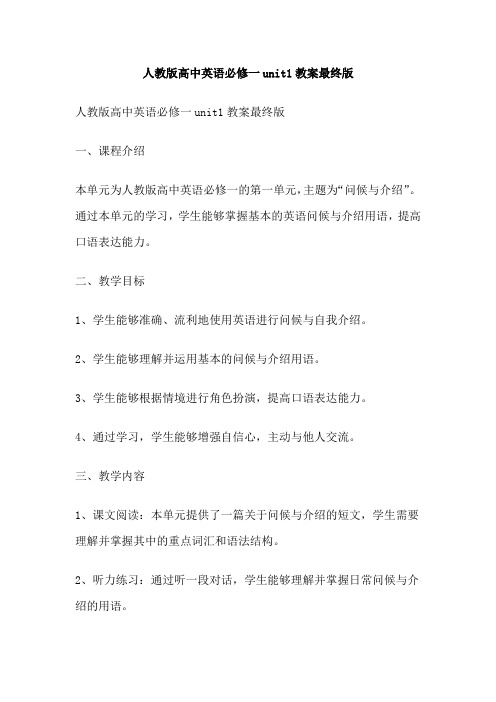
人教版高中英语必修一unit1教案最终版人教版高中英语必修一unit1教案最终版一、课程介绍本单元为人教版高中英语必修一的第一单元,主题为“问候与介绍”。
通过本单元的学习,学生能够掌握基本的英语问候与介绍用语,提高口语表达能力。
二、教学目标1、学生能够准确、流利地使用英语进行问候与自我介绍。
2、学生能够理解并运用基本的问候与介绍用语。
3、学生能够根据情境进行角色扮演,提高口语表达能力。
4、通过学习,学生能够增强自信心,主动与他人交流。
三、教学内容1、课文阅读:本单元提供了一篇关于问候与介绍的短文,学生需要理解并掌握其中的重点词汇和语法结构。
2、听力练习:通过听一段对话,学生能够理解并掌握日常问候与介绍的用语。
3、口语表达:学生需要进行多次口语练习,包括个人介绍、两人对话、小组讨论等,提高口语表达能力。
4、写作训练:学生需要写一篇关于自己或他人的介绍文章,巩固所学知识。
四、教学步骤1、导入新课:通过简单的问候,引导学生进入本单元的主题。
2、讲解新词:学习本单元的新单词,包括生词、词组和习惯用法。
3、课文阅读:阅读本单元提供的短文,并回答相关问题。
4、听力练习:听一段对话,并回答相关问题。
5、口语表达:进行多次口语练习,包括个人介绍、两人对话、小组讨论等。
6、写作训练:写一篇关于自己或他人的介绍文章。
7、复习巩固:回顾本单元所学内容,加深印象。
五、教学评价1、课堂提问:通过提问,检测学生对本单元重点内容的掌握情况。
2、小测验:进行小测验,检测学生对本单元重点词汇、语法和习惯用法的掌握情况。
3、课后作业:布置课后作业,让学生巩固本单元所学内容。
六、教学反思1、成功之处:通过多种教学方法的运用,本节课取得了良好的教学效果,学生积极参与,课堂氛围热烈。
2、不足之处:部分学生的口语表达能力还有待提高,需要加强针对性的训练。
3、改进措施:针对学生的不足,制定个性化的教学方案,加强针对性的训练,提高学生的口语表达能力。
最新人教版高中英语必修一+Unit+1++Friendship全单元教案(精品)名师优秀教案
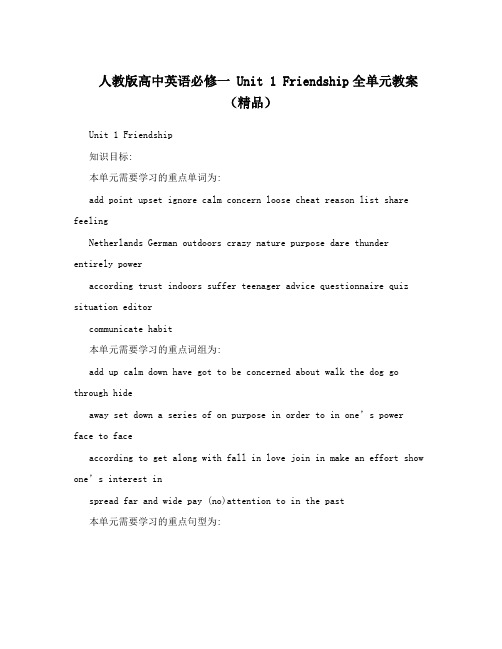
人教版高中英语必修一 Unit 1 Friendship全单元教案(精品)Unit 1 Friendship知识目标:本单元需要学习的重点单词为:add point upset ignore calm concern loose cheat reason list share feelingNetherlands German outdoors crazy nature purpose dare thunder entirely poweraccording trust indoors suffer teenager advice questionnaire quiz situation editorcommunicate habit本单元需要学习的重点词组为:add up calm down have got to be concerned about walk the dog go through hideaway set down a series of on purpose in order to in one’s power face to faceaccording to get along with fall in love join in make an effort show one’s interest inspread far and wide pay (no)attention to in the past本单元需要学习的重点句型为:1. You want to see a very interesting film with your friend, but your friend can’t go until he or she finishes cleaning the bicycle. (not. . . until. . . )2. When he or she borrowed it last time, he or she broke it and you had to pay to get itrepaired. (get sth. done)3. While walking the dog, you were careless and it got loose and was hit by a car. (while doing; get+adj. )4. Your friend, who doesn’t work hard, asks you to help him or her to cheat in the exam by looking at your paper, what will you do? (the Attributive Clause)5. I don’t want to set down a series of facts in a diary as most people do, but I want this diary itself to be my friend. (as. . . )6. I wonder if it’s because I haven’t been able to be outdoors for so long time that I’ve grownso crazy about everything to do with nature. (I wonder if/whether; it’s . . . that. . . )7. . . . I stayed awake on purpose until half past eleven one evening in order to have a goodlook at the moon for once by myself. (stay+adj. ; in order todo. . . )8. But as the moon gave far too much light, I didn’t dare open a window. (don’t dare(to)do. . . )9. . . . it was the first time in a year and a half that I’d seen the night face to face. . . (It is/was the first/second. . . time that+现在/过去完成时)10. Although I really try to talk to my classmates, I still find it hard to make good friendswith them. (find it+adj. /n. +to do. . . )本单元需要掌握的交际功能用语为:1. 态度(attitudes)Are you afraid that. . . ? I’ve grown so crazy about. . . I didn’t dare. . .2. 同意和不同意(agreement and disagreement)I agree. I think so. Exactly.I don’t agree. I don’t think so. I’m afraid not.3. 肯定程度(certainty)That’s correct. Of course not.本单元需要掌握的语法为:直接引语和间接引语(?):陈述句和疑问句1. 陈述句“I don’t want to set down a series of facts in a diary, ” said Anne.? Anne said that she didn’t want to set down a series of facts in a diary.2. 一般疑问句He asked, “Are you leaving tonight? ”? He asked us whether we were leaving that night.3. 特殊疑问句“When did you go to bed last night? ” father said to Anne.? Father asked Anne when she went to bed the night before.能力目标:1. 能运用所学语言讲述朋友间发生的事情以及朋友间的友谊和友情。
英语人教版高中必修一(新课标)教案Unit1 Listening and Talking 教案
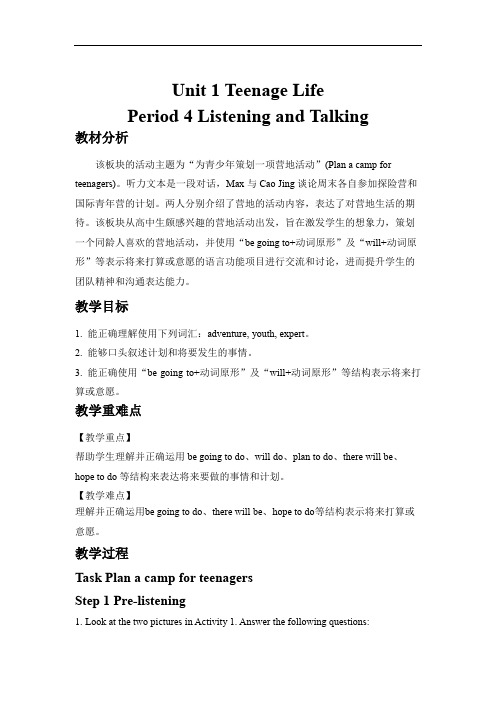
Unit 1 Teenage LifePeriod 4 Listening and Talking教材分析该板块的活动主题为“为青少年策划一项营地活动”(Plan a camp for teenagers)。
听力文本是一段对话,Max与Cao Jing谈论周末各自参加探险营和国际青年营的计划。
两人分别介绍了营地的活动内容,表达了对营地生活的期待。
该板块从高中生颇感兴趣的营地活动出发,旨在激发学生的想象力,策划一个同龄人喜欢的营地活动,并使用“be going to+动词原形”及“will+动词原形”等表示将来打算或意愿的语言功能项目进行交流和讨论,进而提升学生的团队精神和沟通表达能力。
教学目标1. 能正确理解使用下列词汇:adventure, youth, expert。
2. 能够口头叙述计划和将要发生的事情。
3. 能正确使用“be going to+动词原形”及“will+动词原形”等结构表示将来打算或意愿。
教学重难点【教学重点】帮助学生理解并正确运用be going to do、will do、plan to do、there will be、hope to do等结构来表达将来要做的事情和计划。
【教学难点】理解并正确运用be going to do、there will be、hope to do等结构表示将来打算或意愿。
教学过程Task Plan a camp for teenagersStep 1 Pre-listening1.Look at the two pictures in Activity 1. Answer the following questions:(1)What kind of camp is Adventure Camp/International Youth Camp?(2)What activities will it include?(3)What can students learn in these activities?2.Read the sentences in Activity 1. Then predict the main idea of the conversation. Step 2 While-listening1. Work on Activity 1. Listen to the conversation and tick what are heard about the camps.2.Work on Activity 2. Underline the expressions in the sentences above that Cao Jing and Max use to talk about the future.设计意图:该环节让学生通过勾画听力文本中的目标结构,关注对话中如何表达将来要做的事情和计划。
人教版高中英语必修1全册教案
人教版高中英语必修1全册教案
Unit1Friendship
Unit2Englisharoundtheworld
Unit3Traveljournal
Unit4Earthquakes
Unit5NelsonMandela-amodernhero
新课标高中英语1(必修)教学设计与案例
Unit1
(1)课题:Friendship
(2)教材分析与学生分析:本单元的中心话题是“友谊”,几乎所有的内容都是围绕这一中心话题展开的。
WarmingUp部分以调查问卷的形式引导学生了解日常生活中朋友之间发生的真实问题以及解决这些问题的方法;Pre-Reading部分的几个问题启发学生对“友谊”和“朋友”进行思考,使学生明确不仅人与人之间可以做朋友,日记也可以成为人们的朋友;Reading部分Anne’sBestFriend以日记形式讲述了犹太女孩安妮的故事;Comprehending 部分通过连句、多项选择和问答形式帮助学生对课文内容、细节进行更深入的理解;UsingaboutLanguage部分教学本课重点词汇和重点语法项目。
(3)课时安排:Thefirstperiod:Speaking:WarmingUpandPre-Reading
Thesecondperiod:Reading
Thethirdperiod:Grammar
TheforthPeriod:Listening
Thefifthperiod:Writing
(4)教学目标:。
英语人教版高中必修一(新课标)教案Unit 4 Listening and Speaking 教案
Unit 4 Natural DisastersPeriod 1Listening and Speaking教材分析本单元以自然灾害为话题,探讨在“人与自然”的主题之下,当人类面临自然灾害的威胁时,应该树立防灾意识,提高在灾害中逃生和生存的能力。
主题图的内容是汶川地震时解放军战士在废墟中运送伤者的感人画面,体现了在发生重大自然灾害时军民同心,合力救助受灾人员的大无畏的人道主义精神。
而开篇页的引言“Live to Tell: Raising Awareness, Reducing Mortality.”中文可以译为:“用生命呼吁:增强减灾意识,减少人员伤亡。
”这句话是2016年联合国世界减灾日的活动主题,目的是呼吁全球各地的人们重视自然灾害,树立防灾意识。
听力板块的活动主题是“播报自然灾害”(Report natural disasters)。
学生通过观看视频并听新闻播报,最终完成模拟播报自然灾害新闻的活动。
教学目标1. 能正确理解使用下列词汇:disaster, drought, slide, flood, rescue, damage, destroy, death, affect, shelter。
2. 能根据听力问题,预判听力内容并能提炼出关键信息,例如:数字、时间、日期、事由等。
3. 了解新闻播报应包含的基本要素和语言特征。
4.能够简要模仿新闻播报,报道突发的自然灾害。
5. 复习清辅音和浊辅音p/b、t/d、k/g、f/v、th、s/z、sh/g、ch/dg、tr/dr、ts/ds的发音规律,并利用这些规律准确辨音,有效记忆单词。
教学重难点【教学重点】1. 引导学生运用听力策略,主动思考、预判听力要点;2. 引导学生运用新闻套语,模仿听力文本,完成自然灾害的新闻播报。
【教学难点】掌握听前预判听力要点的策略和技能。
教学过程Task 1Step 1 Warming-up1.Look at the opening page and discuss the following questions.(1) What problems/natural disasters do you see in the picture?(2) What do you think the soldiers are doing?(3) Can the person in the picture survive?(4) Can we stop natural disasters from happening?2. Read the quote and discuss the following questions.How do you understand the quote? Do you agree with it?设计意图:通过询问学生对引言的看法,启发学生思考,培养学生的思辨能力。
人教版高中英语必修一unit1教案最终版
1.Teaching Methods 1. Question-inquiry Teaching 2.Task-based Learning and Teaching 3.Analytic Discussion(pair work or group work)
sentence.
(Teacher writes the answers on the blackboard)
Para.1: Anne made her diary her best friend whom she could tell
everything.
Para. 2: Anne’s diary acted as her true friend during the time she and her
三. 教学目标 Teaching Aims
1.Knowledge Objectives 1. Get students to know the main content of this article. 2. Learn about the formats of a diary. 2.Ability Objectives 1. Develop their reading ability and learn to use some reading strategies such as guessing, key sentences, skimming and so on. 2. Summarize different paragraphs. 3.Emotion Objectives
diary?
Clear--- She thought the ordinary diary is a series of facts. She made her
人教版必修一unit1教案
人教版必修一unit1教案教案标题:探索《人教版必修一》Unit 1:Friendship教案教案目标:1. 了解Unit 1的主题和内容,培养学生对友谊的认知和理解。
2. 学习并掌握本单元的重点词汇和短语。
3. 培养学生的听说读写能力,提高他们的语言表达能力。
4. 培养学生的合作意识和团队合作能力。
教学重点:1. 掌握本单元的重点词汇和短语。
2. 培养学生的听说读写能力,提高他们的语言表达能力。
教学难点:1. 提高学生的语言表达能力,使他们能够用英语描述友谊和友谊的重要性。
2. 培养学生的合作意识和团队合作能力。
教学准备:1. 课本《人教版必修一》Unit 1的教材和教具。
2. 多媒体设备和投影仪。
教学过程:Step 1:导入(5分钟)1. 利用图片或视频引入友谊的话题,让学生思考并分享他们对友谊的看法。
2. 引导学生讨论友谊对个人和社会的重要性。
Step 2:词汇学习(10分钟)1. 教师通过多媒体展示本单元的重点词汇和短语,并给出中文解释。
2. 学生跟读并模仿发音,利用图片和例句帮助学生理解词汇的意思和用法。
Step 3:听力训练(15分钟)1. 教师播放录音材料,要求学生听并完成相关的听力练习。
2. 学生互相检查答案,并与教师一起核对答案。
Step 4:口语练习(20分钟)1. 学生分成小组,每个小组选择一个友谊的话题进行讨论,并记录下他们的观点和想法。
2. 每个小组派一名代表向全班汇报他们的讨论结果,并与其他小组进行交流和讨论。
3. 教师对学生的表现进行点评和指导,帮助他们提高语言表达能力。
Step 5:阅读训练(15分钟)1. 学生阅读本单元的阅读材料,并回答相关的问题。
2. 学生互相检查答案,并与教师一起核对答案。
Step 6:写作练习(20分钟)1. 学生根据本单元的写作任务,撰写一篇关于友谊的短文。
2. 学生互相交换作文,并提出修改意见和建议。
3. 学生修改并完善自己的作文,并将其展示给全班。
- 1、下载文档前请自行甄别文档内容的完整性,平台不提供额外的编辑、内容补充、找答案等附加服务。
- 2、"仅部分预览"的文档,不可在线预览部分如存在完整性等问题,可反馈申请退款(可完整预览的文档不适用该条件!)。
- 3、如文档侵犯您的权益,请联系客服反馈,我们会尽快为您处理(人工客服工作时间:9:00-18:30)。
必修1 Unit 1ANNE’S BEST FRIENDDo you want a friend whom you could tell everything to, like your deepest feelings and thoughts? Or are you afraid that your friend would laugh at you, or would not understand what you are going through? Anne Frank wanted the first kind, so she made her diary her best friend.Anne lived in Amsterdam in the Netherlands during World War II. Her family was Jewish so the had to hide or they would be caught by the German Nazis. She and her family hide away for two years before they were discovered. During that time the only true friend was her diary. She said, “I don’t want to set down a series of facts in a diary as most people do, but I want this diary itself to be my friend, and I shall call my friend Kitty.” Now read how she f elt after being in the hiding place since July 1942. Thursday 15, June, 1944Dear kitty,I wonder if it’s because I haven’t been able to be outdoors for so long that I’ve grown so crazy about everything to do with nature. I can well remember that there was a time when a deep blue sky, the song of the birds, moonlight and flowers could never have kept me spellbound. That’s changed since I was here.…For example, when it was so warm, I stayed awake on purpose until half past eleven one evening in order to have a good look at the moon for once by myself. But as the moon gave far too much light, I didn’t dare open a window. Another time some months ago, I happened to be upstairs one evening when the window was open. I didn’t go downstairs until the window had t o be shut. The dark, rainy evening, the wind, the thundering clouds held me entirely in their power; it was the first time in a year and a half that I’d seen the night face to face……Sadly…I am only able to look at nature through dirty curtains hanging bef ore very dusty windows. It’s no pleasure looking through these any longer because nature is one thing that really must be experienced.Yours,AnneUsing Language 语言运用Reading and listening 读与听1 Read the letter that Lisa wrote to Miss Wang of Radio for Teenagers and predict what Miss Wang will say. After listening, check and discuss her advice.Dear Miss Wang,I am having some trouble with my classmates at the moment. I’m getting along well with a boy in my class. We often do homework together and we enjoy helping each other. We have become really good friends. But other students have started gossiping. They say that this boy and I have fallen in love. This has made me angry. I don’t want to end the friendship, but I hate others gossiping. What should I do?Yours,LisaReading and writing 读与写Miss Wang has received a letter from Xiaodong. He is also asking for some advice. Read the letter on the right carefully and help Miss Wang answer it.Dear Miss Wang,I’m a student from Huzhou Senior High School. I have a problem. I’m not very good at communicating with people. Although I try to talk to my classmates, I still find it hard to make good friends with them. So I feel quite lonely sometimes. I do want to change this situation, bu t I don’t know how. I would be grateful if you could give me some advice.Yours,Xiaodong2 Decide which are the best ideas and put them into an order. Then write down your advice and explain how it will help. Each idea can make one paragraph. The following sample and the expressions may help youDear Xiaodong,I’m sorry you are having trouble in making friends. However, the situation is easy to change if you follow my advice. Here are some tips to help you.First, why not…?If you do this,…Secondly, you could / can …Then / That way, …Thirdly, it would be a good idea if …By doing this, …I hope you will find these ideas useful.YoursMiss Wang第二单元THE ROAD TO MODERN ENGLISHAt the end of the 16th century, about five to seven million people spoke English. Nearly all of them lived in England. Later in the next century, people from England made voyages to conquer other parts of the world and because of that, English began to be spoken in many other countries. Today, more people speak English as their first, second or foreign language than ever before.Native English speakers can understand each other even if they don’t speak the same kind of English. Look at this example:British Betty: Would you like to see my flat?American Amy: Yes, I’d like to co me up to your apartment.So why has English changed over time? Actually all languages change and develop when cultures meet and communicate with each other. At first the English spoken in England between about AD 450 and 1150 was very different from the English spoken today. It was based more on German than the English we speak at present. Then gradually between about AD 800 and 1150, English became less like German because those who ruled England spoken first Danish and later French. These new settlers en riched the English language and especially its vocabulary. So by the 1600’s Shakespeare was able to make use of a wider vocabulary than ever before. In 1620 some British settlers moved to America. Later in the 18th century some British people were taken to Australia too. English began to be spoken in both countries.Finally by the 19th century the language was settled. At that time two big changes in English spelling happened: first Samuel Johnson wrote his dictionary and later Noah Webster wrote The American Dictionary of the English Language. The latter gave a separate identity to American English spelling.English now is also spoken as a foreign or second language in South Asia. For example, India has a very large number of fluent English speakers because Britain ruled India from 1765 to 1947. During that time English became the language for government and education. English is also spoken in Singapore and Malaysia and countries in Africa such as South Africa. Today the number of people learning English in China is increasing rapidly. In fact, China may have the largest number of English learners. Will Chinese English develop its own identity? Only time will tell.STANDARD ENGLISH AND DIALECTSWhat is standard English? Is it spoken in Britain, the US, Canada, Australia, India and New Zealand? Believe it or not, there is no such thing as standard English. Many people believe the English spoken on TV and the radio is standard English. This is because in the early days of radio, those who reported the news were expected to speak excellent English. However, on TV and the radio you will hear differences in the way people speak.When people use words and expressions different form “standard language”, it is called a dialect. American English has many dialects, especially the midwestern, southern, African American and Spanish dialects. Even in some parts of the USA, two people from neighbouring towns speak a little differently. American English has so many dialects because people have come from all over the world.Geography also plays a part in making dialects. Some people who live in the mountains of the eastern USA speak with an older kind of English dialect. When Americans moved form one place to another, they took their dialects with them. So people from the mountains in the southeastern USA speak with almost the same dialect as people in the northwestern USA. The USA is a large country in which many different dialects are spoken. Although many Americans move a lot, they still recognize and understand each other’s dialects.第三单元Travel journalJOURNEY DOWN THE MEKONGPART 1 THE DREAM AND THE PLANMy name is Wang Kun. Ever since middle school, my sister Wang Wei and I have dreamed about taking a great bike trip. Two years ago she bought an expensive mountain bike and then she persuaded me to buy one. Last year, she visited our cousins, Dao Wei and Yu Hang at their college in Kunming. They are Dai and grew up in western Yunnan Province near the Lancang River, the Chinese part of the river that is called the Mekong River in other countries. Wang Wei soon got them interested in cycling too. After graduating from college.we finally got the chance to take a bike trip.I asked my sister, "Where are we going?" It was my sister who first had the idea to cycle along the entire Mekong River from where it begins to where it ends. Now she is planning our schedule for the trip.I am fond of my sister but she has one serious shortcoming. She can be really stubborn. Although she didn't know the best way of getting to places, she insisted that she organize the trip properly. Now, I know that the proper way is always her way. Ikept asking her, "When are we leaving and when are we coming back?" I asked her whether she had looked at a map yet. Of course, she hadn't; my sister doesn't care about details. So I told her that the source of the Mekong is in Qinghai Province. She gave me a determined look—the kind that said she would not change her mind. When I told her that our journey would begin at an altitude of more than 5,000 metres, she seemed to be excited about it. When I told her the air would be hard to breathe and it would be very cold, she said it would be an interesting experience. I know my sister well. Once she has made up her mind, nothing can change it. Finally, I had to give in.Several months before our trip,Wang Wei and I went to the library. We found a large atlas with good maps that showed details of world geography. From the atlas we could see that the Mekong River begins in a glacier on a Tibetan mountain. At first the river is small and the water is clear and cold. Then it begins to move quickly. It becomes rapids as it passes through deep valleys, travelling across western Yunnan Province. Sometimes the river becomes a waterfall and enters wide valleys. We were both surprised to learn that half of the river is in China. After it leaves China and the high altitude,the Mekong becomes wide,brown and warm. As it enters Southeast Asia, its pace slows. It makes wide bends or meanders through low valleys to the plains where rice grows. At last, the river delta enters the South China Sea.JOURNEY DOWN THE MEKONGPART 2 A NIGHT IN THE MOUNTAINSAlthough it was autumn, the snow was already beginning to fall in Tibet.Our legs were so heavy and cold that they felt like blocks of ice. Have you ever seen snowmen ride bicycles? That's what we looked like! Along the way children dressed in long wool coats stopped to look at us. In the late afternoon we found it was so cold that our water bottles froze.However,the lakes shone like glass in the setting sun and looked wonderful.Wang Wei rode in front of me as usual.She is very reliable and I knew I did't need to encourage her.To climb the mountains was hard work but as we looked around us,we were surprised by the view.We seemed to be able to see for miles.At one point we were so high that we found ourselves cycling through clouds.Then we began going down the hills.It was great fun especially as it gradually became much warmer.In the valleys colourful butterflies flew around us and we saw many yaks and sheep eating green grass.At this point we had to change our caps,coats,gloves and trousers for T-shirts and shorts.In the early evening we always stop to make camp.We put up our tent and then we eat.After supper Wang Wei put her head down on her pillow and went to sleep but I stayed awake.At midnight the sky became clearer and the stars grew brighter. It was so quiet.There was almost no wind-only the flames of our fire for company.As I lay beneath the stars I thought about how far we had already travelled.We will reach Dali in Yunnan Province soon,where our cousins Dao Wei and Yu Hang will join us.We can hardly wait to see them!Unit 4 EarthquakesA NIGHT THE EARTH DIDN'T SLEEPStrange things were happening in the countryside of northeast Hebei.For three days the water in the village wells rose and fell,rose and fell.Farmers noticed that the well walls had deep cracks in them.A smelly gas came out of the cracks.In the farmyards,the chickens and even the pigs were too nervois to eat.Mice ran out of the fields looking for places to hide.Fish jumped out of their bowls and ponds.At about 3:00 am on july 28,1976,some people saw bright lights in the sky.The sound of planes could be heard outside the city of Tangshan even when no planes were in the sky.In the city,the water pipes in some buildings cracked and burst.but the one million people of the city,who thiught little of these events,were asleep as usual that night.At 3:42 am everything began to shake.It seemed as if the world was at an end!Eleven kilometres directly below the city the greatest earthquake of the 20th century had begun.It was felt in Beijing,which is more than two hundred kilometres away.One-third of the nation felt it.A huge crack that was eight kilometres long and thirty metres wide cut across houses,roads and canals.Steam burst from holes in the ground.Hard hills of rock became rivers of dir.In fifteen terrible seconds a large city lay in ruins.The suffering of the people was extreme.Two-thirds of them died or were left without parents.The number of people who were killed or injured reached more than 400,000.But how could the survivors believe it was natural?Everywhere they looked nearly everything was destroyed.All of the city's hospitals,75%of its factories and buildings and 90% of its homes were gone.Bricks covered the ground like red autumnleaves.No wind,however,could blow them away.Two dams fell and most of the bridges also fell or were not safe for travelling.The railway tracks were now useless pieces of steel.Tens of thousands of cows would never give milk again.Half a million oigs and millions of chickens were dead.Sand now filled the wells instead of water.People were shocked.Then,later that afternoon,another big quake which was almost as strong as the first one shook Tangshan.Some of the rescue workers and doctors were trapped under the ruins.More buildings fell down.Water,food,and electricity were hard to get.people begab to wonder how long the disaster would last.All hope was not lost.Soon after the quakes,the army sent 150,000 soldiers to Tangshan to help the rescue workers.Hundreds of thousands of people were helped.The army organized teams to dig out those who were trapped and to bury the dead.To the north of the city,most of the 10,000 miners were rescued from the coal mines there.Workers built shelters for survivors whose homes had been destroyed.Fresh water was taken to the city bu train,truck and plane.Slowly,the city began to breathe again.Office of the City GovernmentTangshan,HebeiChinaJuly5,2007Dear____,Congratulations!We are pleased to tell you that you have won the high school speaking competition about new Tangshan. Your speech was heard by a group of five judges, all of whom agreed that it was the best one this year. Your parents and your school should be very proud of you!Next month the city will open a new park to honour those who died in the terrible disaster. The park will also honour those who helped the survivors. Our office would like to have you speak to the park vistors on July 28 at 11:00 am. As you know,this is the day the quake happened thirty-____years ago.We invite you to bring your family and friends on that special day.Sincerely,Zhang ShaUnit 5ELIAS’ STORYMy name is Elias. I am a poor black worker in South Africa. The time when I first met Nelson Mandela was a very difficult period of my life. I was twelve years old. It was in 1952 and Mandela was the black lawyer to whom I went for advice. He offered guidance to poor black people on their legal problems. He was generous with his time, for which I was grateful.I needed his help because I had very little education. I began school at six. The school where I studied for only two years was three kilometers away. I had to leave because my family could not continue to pay the school fees and the bus fare. I could not read or write well. After trying hard, I got a job in a gold mine. However, this was a time when one had got to have a passbook to live in Johannesburg. Sadly I did not have it because I was not born there, and I worried about whether I would become out of work.The day when Nelson Mandela helped me was one of my happiest. He told my how to get the correct papers so I could stay in Johannesburg. I became more hopeful about my future. I never forgot how kind Mandela was. When he organized the ANC Youth League, I joined it as soon as I could. He said:“The last thirty years have seen the greatest number of laws stopping our rights and progress, until today we have reached a stage where we have almost no rights at all.”It was the truth. Black people could not vote or choose their leaders. They could not get the jobs they wanted. The parts of town in which they had to live were decided by white people. The places outside the towns where they were sent to live were the poorest parts of South Africa. No one could grow food there. In fact as Nelson Mandela said:“…we were put into a position in which we had either to accept we were less important or fight the government. We chose to attack the laws. We first broke the law in a way which was peaceful; when this was not allowed…only then did we decide to answer violence with violence.As a matter of fact, I do not like violence…but in 1963 I helped him blow up some government buildings. It was very dangerous because if I was caught I could be put in prison. But I was happy to help because I knew it would help us achieve our dream of making black and white people equal.THE REST OF ELIAS' STORYYou cannot imagine how the name of Robben Island made us afraid. It was a prison from which no one escaped. There I spent the hardest time of my life. But when I got there Nelsom Mandela was also there and he helped me. Mr Mandela began a school for those of us who had little learning. He taught us during the lunch breaks and the evenings when we should have been asleep. We read books under our blankets and used anything we could find to make candles to see the words. I became a good student. I wanted to study for my degree but I was not allowed to do that. Later, Mr Mandela allowed the prison guards to join us. He said they should not be stopped from studying for their degrees. They were not cleverer than me , but they did pass their exams. So I knwe I could get a degree too. That made me feel good about myself.When I finished the four years in prison, I went to find a job. Since I was better educated, I got a job working in an office. However, the police found out and told my boss that I had been in prinson for blowing up government buildings. So I lost my job.I did not work again for twenty years until M r Mandela and the ANC came to power in 1994. All that time my wife and children had to beg for good and help from relatives or friends. Luckily Mr Mandela remembered me and gave me a job taking tourists around my old prison on Robben Islannd. I felt bad the first time I talked to a group. All the terror and fear of that time came back to me. I remembered the beatings and the cruelty of the guards and my friends who had died. I felt I would not be able to do it, but my family encouraged me. They said that the job and the pay from the new South African government were my reward after working all my life for equal rights for the Blacks. So now at 51 I am proud to show visitors over the prison, for I helped to make our people free in their own land.。
